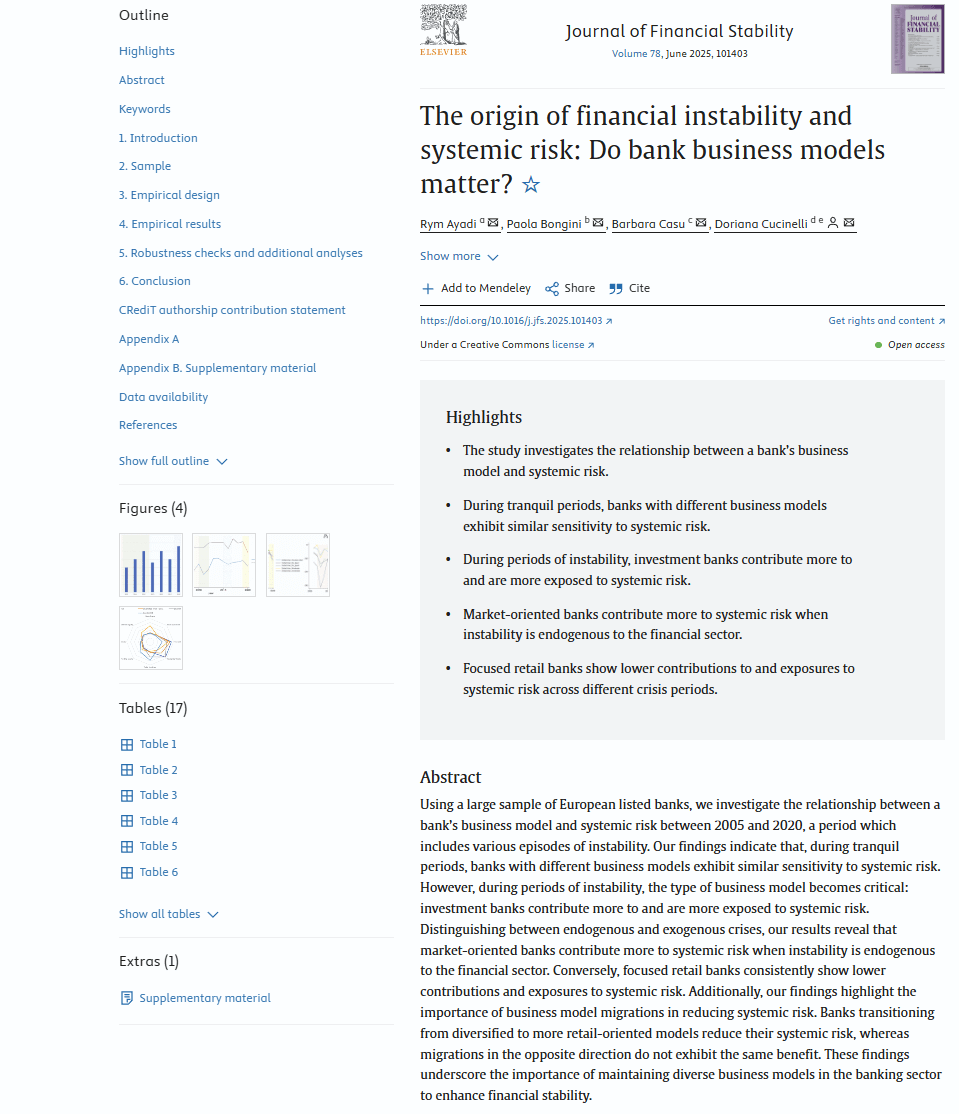The Journal of Financial Stability has published the paper “The Origin of Financial Instability and Systemic Risk: Do Bank Business Models Matter?”, which examines how European banks' business models influence systemic risk from 2005 to 2020.
The paper was co-authored by EMEA President Prof. Rym Ayadi, Professor at Bayes Business School, City University of London, and CEPS Senior Advisor; Prof. Barbara Casu, Professor of Banking and Finance & Director of the Centre for Banking Research at Bayes Business School, City University of London, and EMEA Advisor; Dr. Doriana Cucinelli, Associate Professor of Financial Intermediaries at the University of Parma, Italy, and EMEA Research Fellow; and Prof. Paola Bongini, Professor of Banking and Finance at the Università degli Studi di Milano-Bicocca, and member of the EMEA Expert Panel.
Using a large sample of European listed banks, the paper investigates the relationship between a bank’s business model and its exposure to and contribution to systemic risk. The study covers the period from 2005 to 2020, encompassing multiple crises of different origins: financial (the global financial crisis of 2007–09), economic (the sovereign debt crisis of 2010–12), political (the Brexit referendum and other political events of 2016), and health-related (the COVID-19 pandemic).
The findings reveal that a bank’s business model significantly influences its systemic risk exposure, with variations depending on the origin of the crisis. Bank characteristics also play a crucial role: larger, systemically important banks with a higher risk appetite and market-to-book value contribute more to systemic risk and are more exposed to it. Additionally, highly leveraged banks tend to pose greater systemic risk. The study underscores the importance of maintaining a diverse range of business models within the banking sector to promote financial stability.
On the publication of the paper, Prof. Rym Ayadi highlighted:
“In this paper, we show that not all banks contribute equally to systemic risk—how a bank is structured, how it operates, and the strategic choices it makes truly matter. Understanding the business model is key to anticipating vulnerabilities, especially in times of crisis. Our findings aim to inform smarter, more targeted regulation that protects financial stability without compromising diversity in the banking sector. Going forward, research must deepen the analysis of how evolving risks—such as climate shocks, digitalization, and geopolitical fragmentation—interact with bank business models to shape systemic outcomes.”
Prof. Barbara Casu underlined: “Our findings show that bank business models play a critical role in shaping systemic risk, particularly during periods of financial instability. While all banks are exposed to systemic pressures, market-oriented institutions contribute disproportionately during times of financial stress, warranting closer macroprudential oversight. More broadly, regulation should move away from one-size-fits-all approaches and instead reflect the differentiated risk profiles associated with various business models. Supervisors should complement traditional prudential tools by monitoring the evolution of bank business models, which offer valuable early insight into emerging vulnerabilities.”
The Journal of Financial Stability provides an international forum for rigorous theoretical and empirical analysis of the causes, management, resolution, and prevention of financial crises, including those related to banking, securities markets, payments, and currency.
It should be noted that Prof. Rym Ayadi served as the Chair of the European Banking Authority (EBA) Banking Stakeholders Group (BSG) of which she acted as elected Chair from February 2019 to July 2024. Please see "The EBA publishes the End of Term of Office report of the EBA Banking Stakeholder Group Chaired by Prof Rym Ayadi"
Prof. Ayadi is also the author of the book Banking Business Models: Definition, Analytical Framework and Financial Stability Assessment (Palgrave Macmillan Studies in Banking and Financial Institutions)
Link to the Banking Business Models Research Platform


